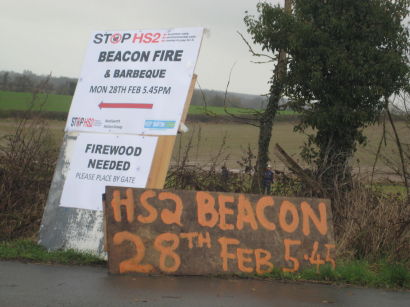THE Department for Transport begins its consultation over the route of HS2 today. Although protestors have continued to make their voices heard, in spite of some ‘greening’ of the proposed alignment, the start of consultation has been welcomed by many.
[Railnews Focus: 28 February 2011. High Speed rail: the USA experience. Download here.]
Passenger Focus rail director Ashwin Kumar said: “All forecasts show that Britain’s railways are only going to get busier. Government and industry must continue progress on this important project as new lines are critical to relieving overcrowding in the future. Putting longer-distance journeys onto these new lines will allow more trains to serve commuters and middle-distance passengers on the current network.
“Wherever this new line is built, there will be winners and losers. It is important that the Government and industry continues to discuss the implications of this decision with affected communities and addresses concerns.”
Michael Roberts, the chief executive of the Association of Train Operating Companies, pointed out that a new High Speed line will unlock capacity on existing conventional routes: “A new high speed line, alongside sustained investment in the existing rail network, is key if we are to meet the transport challenges that will face the country over the coming decades,” he said.
Mr Roberts continued: “Significant economic and environmental gains can be unlocked by cutting journey times, not just to Birmingham, but even more importantly to the UK’s big northern cities where the benefits of high speed will be felt the most.
“The benefits will stretch beyond the cities along the route of the new line. Easing capacity problems on the existing network also offers the option for faster and more frequent services to a number of towns such as Milton Keynes, Watford and Northampton.”
Network Rail, too, has given a thumbs up to this move forward in the plans for High Speed rail within Britain. Its chief executive David Higgins said: “The West Coast Main Line is Britain’s busiest and most economically vital rail artery. It will be completely full by 2024 with no more space to accommodate the continued predicted growth in both passenger and freight traffic. A new high-speed line to Birmingham and the North West is essential to release much needed capacity on the existing line.”
Meanwhile, key players from the West Midlands private and public sectors have joined forces to launch a consortium in support of the proposed High Speed link.
Go-HS2 is a collaboration between big business including The NEC Group, Birmingham Airport, Birmingham Chamber of Commerce, Business Birmingham, the city’s inward investment agency and public bodies Birmingham City Council, Solihull Council and transport authority Centro.
The organisations have come together after carefully weighing up the arguments for and against the project. The consortium said it had spent months analysing research into the rail link’s impact on the West Midlands economy and its ability to release badly needed capacity on the existing rail network, especially on the congested West Coast Main Line.
Geoff Inskip, the chief executive of Centro, said: “Go-HS2 galvanises support for the project within the business and public sector and enables us to speak with one voice on what we believe is the biggest opportunity for wealth and job creation in a generation.
“HS2 can bring 22,000 new jobs to the West Midlands and boost its economy by £1.5 billion a year, and it”s this potential for regeneration combined with its ability to meet future rail demand that makes the case.”
However, opposition also continues. Protestors are planning to light a beacon between Coventry and Kenilworth in the West Midlands tonight, although there has been heavy rain in the area over the weekend.


